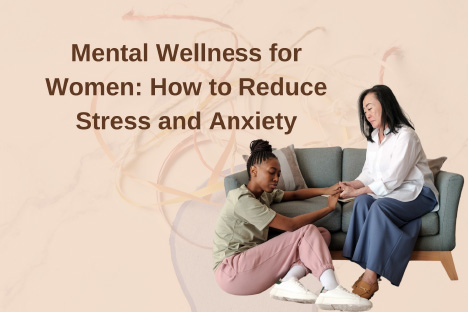Mental Wellness for Women: How to Reduce Stress and Anxiety

In today’s fast-paced world, women often juggle multiple roles—careers, family, social obligations, and personal aspirations. This can result in stress and anxiety, which, if left unchecked, can take a significant toll on both mental and physical health. But managing stress and anxiety is not only possible—it’s essential for your overall well-being.
In this blog, we’ll explore effective strategies that women can adopt to reduce stress and anxiety, prioritize mental wellness, and live healthier, more balanced lives.
1. Practice Mindfulness and Meditation
Mindfulness and meditation have gained widespread popularity as effective ways to manage stress. Mindfulness involves focusing on the present moment, acknowledging your thoughts and feelings without judgment. Meditation takes this a step further by helping you achieve deep relaxation and clarity.
How to Apply It:
- Mindfulness: Start by paying attention to your breath and observing your thoughts. Try mindful eating or mindful walking to bring awareness to your daily activities.
- Meditation: Use apps like Headspace or Calm for guided meditation sessions. Even just 10 minutes a day can significantly reduce stress levels.
- Regular mindfulness practice helps calm your mind, increase emotional regulation, and reduce anxiety over time.
2. Prioritize Self-Care: It’s Not Selfish, It’s Necessary
As a woman, you might feel the constant pressure to take care of everyone else, sometimes neglecting your own needs. However, prioritizing self-care is essential for mental wellness. Taking time for yourself replenishes your energy, boosts your mood, and enhances your ability to deal with stress.
How to Apply It:
- Schedule regular “me-time” to do something you love—whether it’s reading a book, taking a long bath, or going for a walk in nature.
- Make sure you get enough sleep, eat nutritious meals, and engage in physical activities that you enjoy.
- Set boundaries by saying “no” when you feel overwhelmed or when something doesn’t align with your needs.
3. Exercise Regularly: Move Your Body to Relieve Stress
Exercise is one of the most effective ways to combat stress and anxiety. Physical activity helps release endorphins—natural mood boosters that reduce stress and promote a sense of well-being. It also improves sleep quality, which can further help alleviate anxiety.
How to Apply It:
- Incorporate activities that you enjoy, such as yoga, swimming, dancing, walking, or strength training.
- Even a brisk 30-minute walk each day can make a significant difference in reducing stress.
- Try engaging in mind-body exercises like yoga or tai chi, which combine physical movement with relaxation techniques.
4. Cultivate a Supportive Network: Surround Yourself with Positivity
Isolation can exacerbate feelings of anxiety and stress. Having a strong support system, whether it’s friends, family, or even online communities, can make a huge difference in managing mental health. Talking to someone you trust allows you to share your feelings, receive advice, and feel validated.
How to Apply It:
- Make time to connect with loved ones, even if it’s just a quick phone call or coffee date.
- Join groups or online communities that share your interests or mental wellness goals.
- Don’t hesitate to reach out for professional help if needed. A therapist or counselor can provide valuable insights and coping strategies.
5. Develop Healthy Thought Patterns: Challenge Negative Thinking
Negative thought patterns often fuel anxiety and stress. The way we perceive situations—whether we view them as threats or challenges—plays a key role in how we respond emotionally. Developing healthy thought patterns and practicing self-compassion can help you manage stress more effectively.
How to Apply It:
- Challenge negative thoughts by asking yourself: “Is this thought based on facts or assumptions?” or “What evidence do I have to support this?”
- Practice positive affirmations daily to counteract negative thinking and boost self-confidence.
- When you feel anxious, try to reframe your thoughts by focusing on potential solutions rather than problems.
6. Manage Your Time Effectively: Reduce Overwhelm
Feeling overwhelmed is a common cause of stress. A disorganized schedule or feeling like there’s too much to do in too little time can lead to anxiety. Managing your time effectively allows you to stay on top of responsibilities without burning out.
How to Apply It:
- Break down tasks into smaller, manageable chunks and prioritize them based on importance.
- Set realistic expectations for yourself, and don’t be afraid to delegate when necessary.
- Use tools like planners, to-do lists, or digital apps (like Google Calendar or Trello) to stay organized and focused.
7. Practice Breathing Exercises: Calm Your Nervous System
Breathing exercises are a simple yet powerful tool for reducing stress and anxiety. Deep breathing activates the parasympathetic nervous system (the “rest and digest” system), which counteracts the body’s stress response and helps restore balance.
How to Apply It:
- Try the 4-7-8 breathing technique: Inhale for 4 seconds, hold your breath for 7 seconds, and exhale slowly for 8 seconds. Repeat for a few minutes.
- Another effective exercise is diaphragmatic breathing—breathe deeply into your belly, letting your diaphragm expand as you inhale.
- Use breathing exercises whenever you’re feeling overwhelmed, anxious, or stressed. You can also do them before bed to improve sleep quality.
8. Limit Screen Time and Digital Detox
Excessive screen time, especially on social media, can contribute to feelings of stress and anxiety. Constant comparison, exposure to negativity, and information overload can leave you feeling mentally drained. Taking breaks from screens can help reset your mind and improve your overall mental wellness.
How to Apply It:
- Set boundaries on screen time—try the “no screens” rule during meals or 30 minutes before bed.
- Take digital detoxes regularly, especially on weekends or during vacations.
- Engage in offline activities that help you relax, like reading, journaling, or spending time outdoors.
9. Eat a Balanced Diet: Nourish Your Mind and Body
What you eat directly affects how you feel. A diet rich in whole foods, healthy fats, lean proteins, and fruits and vegetables can improve mood, boost energy levels, and reduce stress. On the other hand, a diet high in processed foods and sugar can exacerbate anxiety and make it harder to cope with stress.
How to Apply It:
- Include more brain-boosting foods in your diet, such as fatty fish (rich in omega-3s), leafy greens, berries, and nuts.
- Stay hydrated by drinking plenty of water throughout the day.
- Avoid over-reliance on caffeine and sugar, which can lead to mood swings and energy crashes.
10. Practice Gratitude: Shift Your Focus to Positivity
Gratitude is a powerful tool for reducing stress and increasing happiness. By focusing on the positive aspects of your life, you train your mind to appreciate what you have rather than worry about what you lack. A daily gratitude practice can lead to improved mental wellness and a more balanced outlook on life.
How to Apply It:
- Keep a gratitude journal and write down three things you’re grateful for each day.
- When you feel stressed or anxious, take a moment to reflect on what’s going well in your life.
- Share your gratitude with others—expressing appreciation can strengthen relationships and foster a sense of connection.
Final Thoughts: Nurturing Your Mental Wellness
Mental wellness is just as important as physical health. Reducing stress and anxiety is essential for living a fulfilling and balanced life. By practicing mindfulness, prioritizing self-care, exercising, managing your time, and nourishing your body, you can significantly improve your mental well-being.
Your Challenge:
Take one of the strategies mentioned in this blog and implement it into your daily routine for the next 30 days. Track how it affects your stress and anxiety levels. Remember, small changes can lead to big improvements in your mental wellness!










